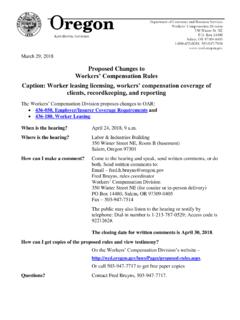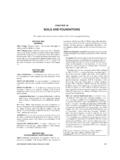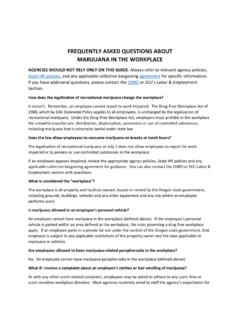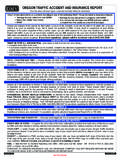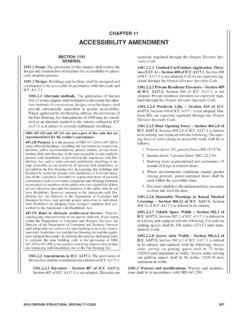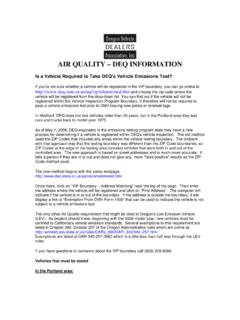Transcription of Oregon Workers’ Compensation
1 Oregon Workers Compensation :Frequently Asked QuestionsThis brochure is intended only as a general guide on Oregon workers Compensation and is not intended to represent official interpretations of the law. Workers Compensation insurance pays for workers medical treatment and lost wages on accepted claims when workers suffer work-related injuries and illnesses. By law, Oregon employers that have one or more employees, full or part time, must carry workers Compensation insurance or be self-insured. Workers Compensation insurance not only protects workers, but also protects employers by shielding them from liability lawsuits that might result from work-related injuries or is workers Compensation insurance?
2 Employers pay premiums to workers Compensation insurance companies, and those premiums finance most of the benefits received by workers if they are injured or suffer an occupational disease on the pays for workers Compensation ?The Workers Compensation Division (WCD) administers and regulates laws and rules that affect the participants in the Oregon workers Compensation system. The division oversees programs and services that help ensure timely and appropriate medical treatment and time-loss benefits to injured workers, while helping keep costs and burdens low for Oregon employers. The division also administers return-to-work programs that help injured workers return to their previous job or find new regulates workers Compensation ?
3 All employers in Oregon that are required to provide workers Compensation coverage must display a Notice of Compliance poster in a central gathering area such as a break room where workers will see it. QWhat information does an employer have to display to comply with workers Compensation ?Workers who have work-related injuries or illnesses may elect to file a claim to receive workers Compensation benefits. They must fill out the Report of Job Injury or Illness (Form 801) from their employers or the Worker s and Physician s Report for Workers Compensation (Form 827) from their doctors.
4 Either QIf a work injury or illness occurs, how is it reported?form begins the claim process and is sent by the employer or doctor to the insurer. Employers should notify their workers Compensation insurance company within five days of knowledge of the claim. Employers cannot prohibit workers from filing a claim. Even if a worker does not want to file a claim, the employer should offer the Form 801 and maintain a copy of it. An employer cannot direct care, even if the worker is enrolled in a managed care organization (MCO). The worker may go to a medical facility or doctor of his or her choice.
5 In the case of an MCO, the worker may still select a doctor within the an employer direct an injured worker to a particular doctor or facility?An insurer must accept or deny a claim within 60 days and, subsequently, notify WCD within 14 days of acceptance or denial. When an insurer denies a claim, it must send the worker a letter explaining why the claim was denied and provide information about the right to appeal the denial to the Hearings Division of the Workers Compensation Board (WCB). When an insurer accepts a claim, QWhat is the time frame to accept or deny a workers Compensation claim?
6 It must send the worker a Notice of Acceptance letter specifying the medical conditions that will be covered under the claim. WCD oversees claims handling by auditing insurers files to see if claims were processed accurately and in a timely temporarily or permanently disabled by accepted work-related injuries or illnesses may receive payment from the workers Compensation insurer for lost wages and permanent disability. Some workers may qualify for vocational services. Oregon s workers Compensation benefits also include death order for injured workers to receive payments for time lost from work, health care providers must notify insurers or self-insured employers of the injured workers inability to work.
7 After the original injury, workers will not be paid for the first three calendar days they are unable to work unless they are totally disabled for at least 14 consecutive calendar days or are admitted to QWhat are benefit payments?a hospital as an inpatient within 14 days of the first onset of total will receive a Compensation check every two weeks during the recovery period as long as health care providers verify the workers inability to work. These checks will continue until the workers return to work or are considered medically stationary. Time-loss benefits are two-thirds of a worker s gross weekly wage at the time of injury up to a maximum set by Oregon an injured worker s doctor determines that the worker s work-related injury or illness is not expected to improve with further treatment or the passage of time, the worker is considered medically stationary.
8 The insurer will notify the worker that the claim will be closed and how much, if any, permanent disability payment is due. QWhat does medically stationary mean?When claims are accepted, insurers or self-insured employers will pay medical bills due to medical conditions the insurers accept in writing, including reimbursement for prescription medications, transportation, meals, lodging, and other expenses up to a maximum established rate. Injured workers must make a written request for reimbursement and attach copies of receipts. Medical bills are not paid before claim acceptance. Bills are not paid if a claim is denied, with some exceptions.
9 Contact the insurer or self-insured employer for questions about medical bill medical treatments will workers Compensation insurance pay for?WCD administers two programs that help injured workers return to work: the Employer-at-Injury Program, which offers incentives to employers to provide light-duty work during a worker s recovery, and the Preferred Worker Program, which offers employers incentives, such as worksite modification and wage subsidies to hire injured workers. Contact the division for more information at 800-445-3948 (toll-free).QWhat if an injury prevents a worker from returning to his or her job?
10 An insurer or injured worker may request mediation services from WCD or the Workers Compensation Board (WCB) if there is a dispute about a claim issue, or request a hearing or an administrative review. There are time limits for most appeals and some issues must be appealed to WCD before going to WCB. QWhat if the insurer or worker disagrees with a decision?Workers may represent themselves. However, workers Compensation is complex and injured workers may want to hire an attorney to handle the appeals process. Attorney fees are paid out of or in addition to any Compensation that may be awarded to the injured worker.
